We close Game of Thrones Unlocked for Season 6 with thoughts on the finale from three of our writers. In this article, Matthew Wrather, Peter Fenzel, and Ben Adams tackle “The Winds of Winter” (Season 6, Episode 10).
Matthew Wrather: How do you say “Speech Act” in Westerosi?
Throughout our Game of Thrones Unlocked posts for Season 6, we have talked largely about how individual characters manage to navigate the political, institutional, and traditional circumstances they find themselves in. Whether we’re talking about oath making or breaking, how characters cope with contradictory imperatives or manage to deny magic to what we know will be their great cost, or the ways a house is sometimes a house and sometimes a home, the focus has been on how the institutions and traditions are defined or renegotiated, and how the real people—real fictional people—of Westeros manage to carve out a life form themselves under those sometimes-contradictory sets of constraints.
In the first recap of the season, I focused on vows as a type of prophecy—a prophecy of the self. And this final episode, far more meaty than Game of Thrones’s the usual episode 10 fare of denoument and table-setting and, to me at least, far more satisfying than the epic battles of episode 9, I want to revisit and revise my theory to encompass more types of vows, or of vow-like statements.
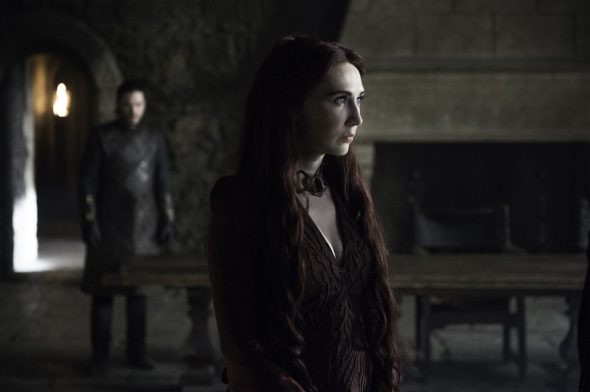
To me the key moment in this thematic register was Melisandre, confronted with the horrific metonymy of Shireen Baratheon’s burnt toy stag (by the way, Davos, good priority setting there: win the battle, and then confront the witch—Jon has soemthing to learn from you) and lambasted for lying about the chosen one, shoots back: “I didn’t lie. I was wrong.”
We recognize a moral difference between lying and being wrong even when the statement in question is exactly the same either way—and, crucially, even when and results in question are exactly the same. Poor, too good for this world Shireen would have been burned at the stake in either case, but if you believe what Melisandre believes—or, I think, even if you merely grant that she is entitled to believe it sincerely—her killing is not a murder.
The British philosopher J. L. Austin theorized a type of utterance called a “speech act,” where the utterance has the force of performing an action. In order to illustrate a few facets of speech acts, consider the phrase: “Don’t spoil Game of Thrones.” Austin distinguished three aspects of this speech act.
- First as a “locutionary act”: the utterance itself, its phonological content, its various kinds of linguistic structure;
- next as an “illocutionary act,” the intention behind the speech act—here the speaker is either pleading or demanding that you quit it with the spoilers, depending on status;
- and finally, as an optional “perlocutionary act”, this aspect comprising any results of the utterance, whether they are tangible or psychological. If you are persuaded to stop spoiling Game of Thrones when someone asks you to, that is the perlocutionary act.
The interesting thing about speech acts in Austin’s formulation is that they are outside the real of truth and falsity. If I tell Jon Snow, “I swear you my sword,” there is no truth content to evaluate in the utterance qua performance. Whether or not I follow through on the vow, the utterance-as-performance remains the same; in other words, whether I keep my promise or not, I made the promise all the same.
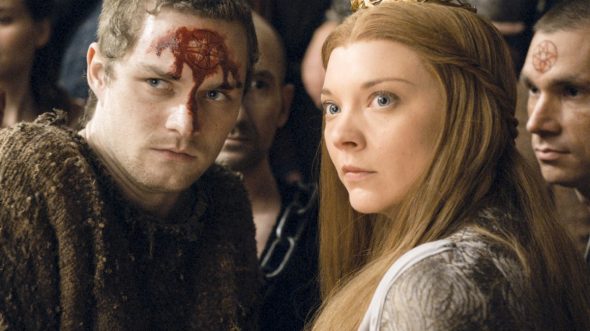
This is an episode where speech acts carry particular weight. The first one, from Loras Tyrell in the courtroom scene, is “to confess.” It’s a very straightforward speech act: the confession itself satisfies the high sparrow (it’s actually a confession and a renunciation, since Loras promises to forsake his family and serve the seven, at which point the knives come out) and is enough to change his status from “condemned” to “forgiven.”
The whole thing is immediately enshrouded in a cloud of billowing green irony, however, since the renunciation seems trivial in comparison to THE FRIGGIN’ SEPT OF BAELOR EXPLODING. And Cersei lampoons the idea of confession—its salutary effects in particular—immediately after in her brief, ahem, enhanced interrogation of the septa. But even diminished by context, we should recognize it as a significant moment.
Sansa, on the other hand, wasn’t wrong: She lied (by omission). Her admission of it here troubles me, because even though the manifest content of the scene is about her and Jon making common cause, the omission itself, and her later conversation with Littlefinger, makes me fear we’re headed for some Stark-on-Stark drama, and that’s more or less the last ting I’m interested in.
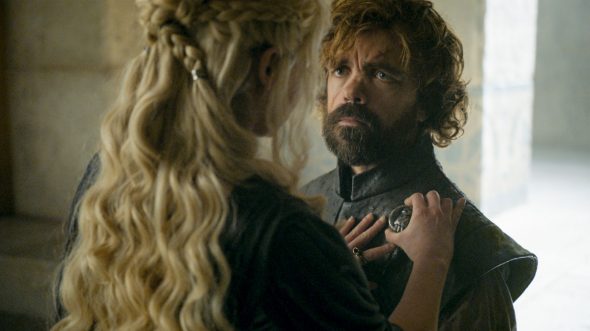
Because the dragon army is underway! Danerys reminds Daario of the content of his vow when she orders him to stay behind in Mereen. And then she appoints Tyrion Hand of the Queen. She has a nice pin for him to wear, just like the one he wore for Joffrey, but the pin is inconsequential. Declarations—legal judgements, marriage pronouncements, and, here, an appointment—are the speech acts which change actual reality, and he is the hand of the king even if a bunch of really tall, mean Unsullied steal his pin and play keep-away.
Finally, I want to skip to the dual coronations at the end of the episode, because the way they play out reveals some differences in how authority has settled in the north and south. In reverse order, then: When Qyburn sets the crown on the head of Cersei Lannister, first of her name, and pronounces her queen, I’m not convinced that the speech act is actually a declaration. Just like Tyrion is Hand with or without the jewelry, Cersei is queen with or without the pronouncement: her actions have made it so that there is no other choice. (In my fantasy director’s cut version of this episode, Littlefinger gets a raven from King’s Landing and has to shake his head in admiration: game recognize game.)
Rather this is more like a representation (in the legal sense): The speaker intends to identify him or herself with the propositional content of the utterance, in this case, “Cersei is ruler.” The speech act doesn’t change reality, it confirms it, or rather it confirms the speaker as committed to a certain version of it.
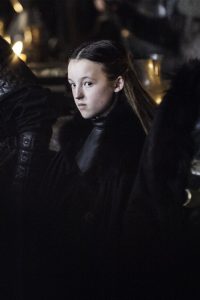 Sassy Tween Lyanna Mormont, and by the way can we take just a moment to give a slow clap for young actor Bella Ramsey, who was easily one of the five best things about Season 6 and is headed I hope to a very bright future of not taking shit from anyone, OK I’m back now, Sassy Tween Lyanna Mormont’s mead hall game is fierce, and she schools the old geezers with her awesome speech and unequivocal declaration, “There is no King but the King in the North, whose name is Stark.” This too is a representation: She doesn’t have the power to make it so just by saying it, but she commits herself to that proposition.
Sassy Tween Lyanna Mormont, and by the way can we take just a moment to give a slow clap for young actor Bella Ramsey, who was easily one of the five best things about Season 6 and is headed I hope to a very bright future of not taking shit from anyone, OK I’m back now, Sassy Tween Lyanna Mormont’s mead hall game is fierce, and she schools the old geezers with her awesome speech and unequivocal declaration, “There is no King but the King in the North, whose name is Stark.” This too is a representation: She doesn’t have the power to make it so just by saying it, but she commits herself to that proposition.
But an interesting thing happens. As one by one the northern Lords make their vows, the accumulated tonnage of their pledges (actually, of their confessions, atonements, and pledges) becomes a collective declaration. If one Lord calls you King in the North you’re nothing; if they all do you’re, well, King in the North.
One more observation before I wrap up my final “Unlocked” post: It’s novel and kind of fun that all the forces on a collision course in Westeros are led by women: Dany and Yara are sailing, presumably, for Dorne, where Ellaria Sand and Olenna Tyrell (Sassy Tween Lyanna Mormont’s spirit animal) are plotting with Varys (eunuch). Cersei is on the Iron Throne demonstrating that a female ruler can be ten times as despicable as Joffrey ever was, and with Littlefinter backing Sansa at Winterfell I’d say the north is (big sigh) at least contested. Super Ninja Arya is a force unto herself, and in this episode she killed the last remaining patriarch of Ned Stark’s generation. Who run the world?
Peter Fenzel: The Secret of the Three Wine Glasses
The season finale of Game of Thrones had a great, complex, textured, tension-building motif of the sort we haven’t seen a lot this season: three significant glasses of wine. They’re in plain sight, and they have a lot to say about this episode and how it works.
A first person drinks the glass, then that person gives wine to somebody else who drinks it. In each instance, the passing of the wine accompanies bad news that has been a long time coming.

The first glass of wine is Cersei’s. She drinks it herself as the Sept of Baelor burns, and she pours wine on the face of Septa “SHAME” as she introduces her to the notion of torture until her death in a promised and long-awaited revenge.

The second glass of wine is Daenerys’s. She drinks it herself before Daario comes to see her. She breaks up with Daario, and before he leaves, he takes a sip of wine himself. It’s a lesser pain, but a pain nonetheless. And she should have done it a long time ago.
Now, you might notice both of these because they are big, ornate glasses of wine with a somewhat similar design in similar close-up shots. Thanks to the good ol’ rule of threes, at this point a whole lot of people, consciously or subconsciously, will be looking for a third glass of wine to show up.
The rule of threes is a language, imagery, and storytelling principle that patterns that come in threes are more memorable, more satisfying and funnier when they want to be. Whether this rule is true by nature or not, audiences are so accustomed to reading things in threes after thousands of years of storytellers following this rule that when they see two of a pattern, they come to expect a third.
And I was absolutely thrilled when the third glass of wine in this episode made itself known, especially since it was tucked into the plot so nicely.
It turns out we’ve already seen the first half of the third glass of wine.
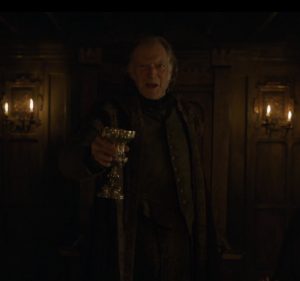
Walder Frey holds his big shiny chalice way out in front of him in the middle of the frame. At this point, we aren’t looking for this third significant glass of wine yet, since it’s a different style cup and hasn’t established the pattern. But it’s been impressed in our memories.
It’s also worth noting that the glass is symbolically being offered to Jaime Lannister, who refuses to drink it.
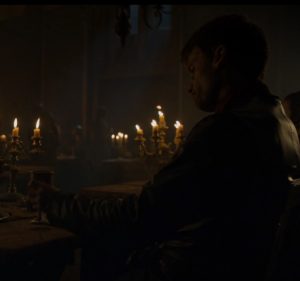
You’ll then note that the serving girl comes by, and she gives a knowing look at Jaime Lannister. Bronn is convinced it is a look of sexual appetite. He is wrong.
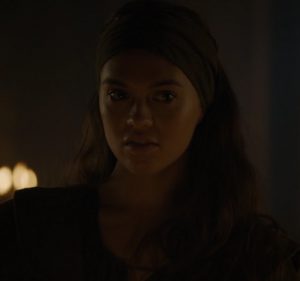
This is Arya. Walder Frey tells us he doesn’t recognize her from his feasts, so presumably Arya has stolen this face from somewhere else and brought it to The Crossing. Three things are worth noting here:
- Initially she seems surprised to see Jaime. She probably did not know for certain he was here. The camera pauses on her, and she masks it with a look of flirtation.
- Jaime, notably, is not on Arya’s death list, even though he killed her father’s guard Jory and pushed Bran out a window. Unlike the other people on her list, the bad things Jaime has done all happened when Arya wasn’t really around.
- Because Jaime does not drink from his glass and Arya doesn’t need to refill it, we do not know at the end of this episode whether Arya would murder Jaime if she had the opportunity. Tension!
(By the way, it’s kind of cool how this moment is like a seder. Jaime is a first-born son, everyone tells a story about the past, many glasses of wine are shared, and the angel of death passes over him.)
At any rate, we finally find the third glass of wine, when Arya pours a glass for Walder Frey and serves his sons to him in a pie before murdering him.
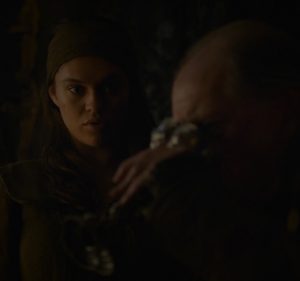
It was a long time coming for Walder and it brings Arya back to the Westeros story in a big way, but the motif of the wine glasses is there in the background, tying together the different characters, setting up subtle patterns and expectations, and making the payoff deeper and more satisfying.
Sharp eyes notice Walder’s wine differs from the other wine fits what happens to him, and this sort of thing is so much better when form follows function:
- Septa SHAME wronged Cersei, and Cersei forces the Septa to drink her wine of vengeance.
- Daario wanted Daenerys in a way she did not want him, and Daenerys shares her wine of heartbreak, but he has to drink by himself.
- But for the third one, Walder Frey carried out the Red Wedding, and Arya serves him his own wine. In his own house, in his own cup.
With the others, there is a sense that “I am doing this to you,” but with Walder, there is more of a sense of “you did this to yourself.”
If you think these wine glasses in these scenes are just a coincidence, note two things:
- In the meeting between Ellaria Sand, the Sand Snakes, and Oleanna Tyrell, there is wine on the table, but nobody drinks any of it, even though both families are from wine-producing regions, and Olenna in particular comes from a wine-producing family (her maiden name is Redwyne).
- In the big “King in the North” scene, which is several minutes long, even though it looks like everybody has a drink, none of the main characters drink. Few of the people in the background ever take a drink, and when a few extras do, they cut away from it very fast.
These scenes also represent the plans of Varys and Littlefinger, which are well on their way, but have not yet come to fruition.
Or, should I say, their grapes are not yet ripe for the vintage.
Ben Adams: I Have A Vision
This episode has a lot to say about the future. Littlefinger thinks that the future is made in one particular way: you put a picture in your head, and then bend every action towards making that picture a reality. In that world, “The past is gone for good. We can sit here mourning its departure, or prepare for the future.”
Dany certainly believes that. She’s had one picture in her head since Season 1—striking out across the Narrow Sea with a horde of Dothraki at her back and dragons flying overhead. Perhaps that’s why she finds it so easy to get rid of her favorite mistress/sellsword—he’s not a part of that picture.
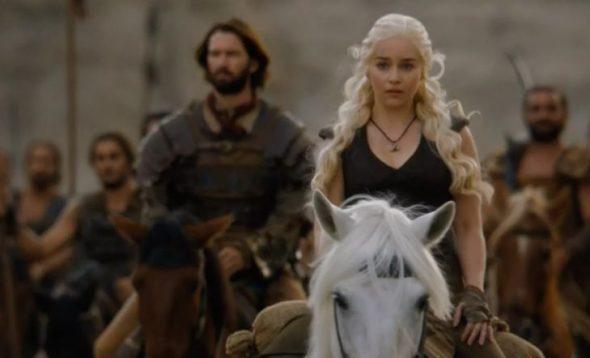
Cersei believes it. She’s always dreamed of sitting the Iron Throne—not as wife to Robert Baratheon, not as regent to one of her awful “Baratheon” children, but as Queen Cersei Lannister, first of her name.
And to some extent, Arya believes that too. Since Ned Stark got his head chopped off, she’s had a list of names, and now she’s finally able to start checking them off, one by bloody one.
But this isn’t the only way to look at the future. As Maester Qyburn puts it, “Sometimes before we usher in the new, the old have to be put to rest.” The past has a powerful grip on our characters, whether they like it or not.
The Red Woman can’t just stay “Oops, I was wrong, sorry about burning that girl at the stake.” Actions have consequences. The Glovers and other wayward houses of the North can’t just forget the whole “sorry we didn’t honor our vows to the Starks like this 10 year old girl did” thing—they have to own up to it before they can bend the knee to the New King in the North.
When I think about the future of Westeros based on this episode, one thing sticks out in my mind. Pretty much every plot line in this episode was the culmination of six seasons of work to get the characters where they needed to be so that we can have our final battle of (kinda) good vs. (extremely) evil:
- Cersei’s moment of crowning horror and triumph resulting in her being crowned Queen in her own name;
- Jon Snow, now a confirmed-true-born Stark and Targaryen, being crowned the King in the North;
- Dany striking out across the sea with a fleet of ships, a horde of Dothraki and three fully grown dragons;
- Arya, checking names off of her list with magical assassin powers;
- and Samwell Tarly, having access to a bunch of books.
OK, one of these things is not like the other. Earlier in this season, I noted, “Just like jazz is all about the notes you don’t play, Game of Thrones is all about the stabbings that don’t happen.” With the cacophony of explosions and death, Sam getting shade from a receptionist and being shown a big library stood out like the eye of a hurricane.
So what is that scene doing here?
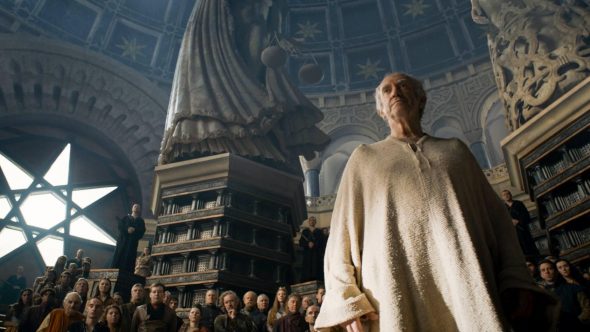
This is an episode with one eye on the future, one eye on the past. This episode begins with a loving and beautiful view of the Sept of Baelor. The Seven Pointed Star iconography is everywhere, and the High Sparrow is shot with heroic statuary over his shoulder every chance the director gets. And then the Sept is destroyed in a ball of green fire: so goes the past.
Almost immediately after the destruction of that holy place, we’re treated to a view of our new holy place, a library sending out white ravens to all of the Seven Kingdoms. We used to have fire and religion; now we have winter and books.
I think that this episode is telegraphing that the old pomp, circumstance and superstition is all but burned away our religious fanatics are all pretty much gone at this point, and we’re left with three fairly pragmatic centers of power: King Jon Snow-Stark-Targaryan, Queen Danaerys, and Queen Cersei.
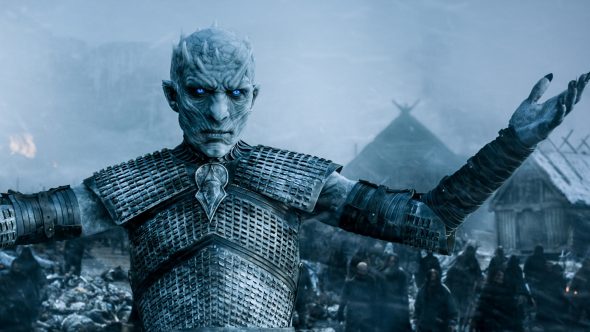
And of course, the Night’s King, coming down over the Wall. Winter is Here, and maybe the only thing that will save you is the right book.
What did you think of the finale, and of Season 6? Let us know in the comments below.
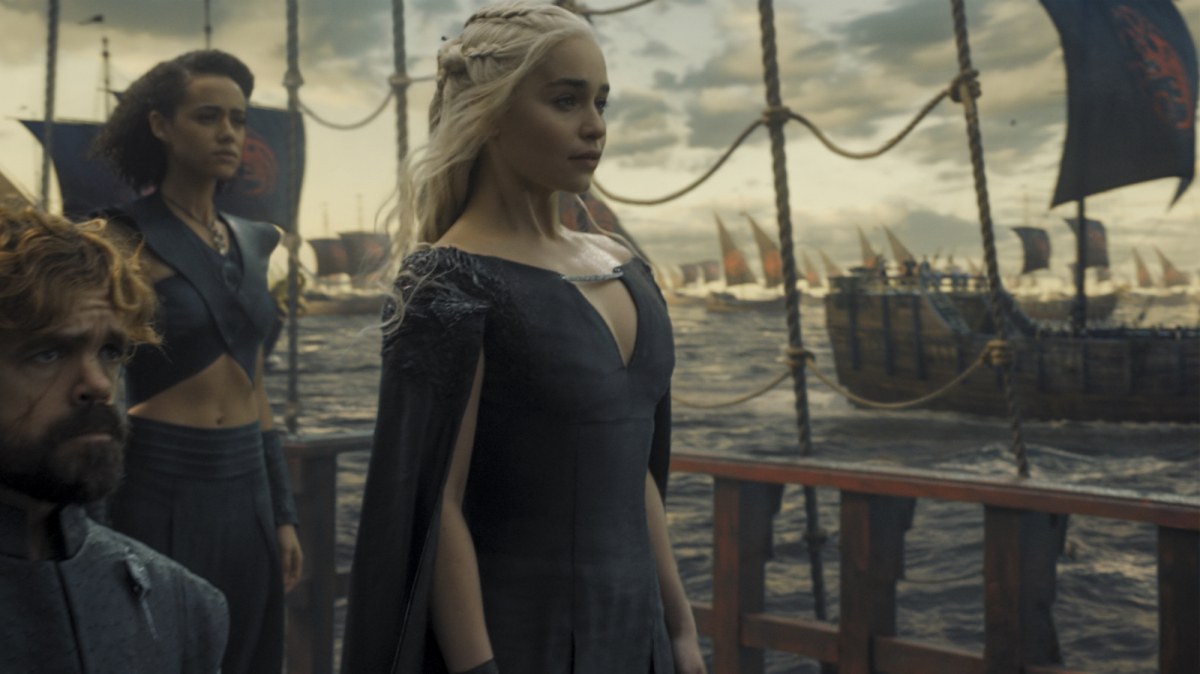
A few random thoughts:
1) Littlefinger is talking about The Secret, right? Does he have a vision board tucked away somewhere in the back of one of his brothels?
2) The speech-act thing lines up interestingly with the tetchy receptionist that Sam meets at the Citadel. Because speech-acts, from a certain point of view, are about compelling reality to align with the shape of discourse: first I say that this ship is called Boaty McBoatface (discourse), and then this ship is called Boaty McBoatface (reality). So what happens in Oldtown? Sam shows up and says “Hey, Lord Commander Snow sent me, I’m the new maester for the Watch.”
Tetchy McGee’s like “According to this book, you aren’t the Maester and he’s not the Lord Commander either.”
“Yeah,” Sam tells him, “your book is out of date. Those old guys all died.”
And then Tetchy crosses Jeor Mormont and Aemon Targaryen out of the book.
A scientist, from a certain point of view, is just somebody who thinks that Discourse needs to be changed to reflect Reality, rather than the other way around.
Oh and one more thing: I’m calling it now, Jaime will end up murdering Cersei in exactly the same way, and for exactly the same reasons, that he murdered King Aerys the Mad.
Ooooooh I had the same thought! Kingslayer/Queenslayer! You beat me to it.
To add to that, (and maybe Spoilers from the book?). The witch who prophesied the death of Cersei’s three children, also said she would die by her “younger sibling’s hand.” Cersei has taken that to mean Tyrion, but it could also mean Jamie, who is the younger twin.
“Cersei is queen with or without the pronouncement: her actions have made it so that there is no other choice. (In my fantasy director’s cut version of this episode, Littlefinger gets a raven from King’s Landing and has to shake his head in admiration: game recognize game.)”
Littlefinger would laugh at how perfectly she has done the ham-fisted job he wanted her to do. True to her paranoid temperament and short-sightedness, she has ruined the old power structure and made the throne so vulnerable that it’s ripe for the taking, just as he’s on the verge of having the power to take it. His efforts to increase her influence and keep her in power despite herself have paid off handsomely.
Let’s look at what Cersei commands.
* She has King’s Landing, Casterly Rock (with its exhausted mines), and probably Dragonstone.
* Everything in the Riverlands was eaten or burned during the war, and she’s made enemies of the Tyrells who control the fertile Reach. That’s particularly a problem because the crown is still deeply in debt to the Iron Bank of Braavos (among others).
* The best warriors and strategists who served the crown are virtually all dead, maimed, or serving her enemies.
* She has no heirs or close relatives except for Jaime (not eligible for the crown) and Tyrion, so if Cersei dies, the only people who might have a hereditary claim are her enemies. (Somewhere out there, the last person known to have Baratheon blood, Gendry, is twiddling his thumbs.)
* If Cersei doesn’t know yet, she soon will learn that between the Starks and Littlefinger, everything from Bear Island down to the Vale and Harrenhal is combined against her. Well, everything except the Twins, but that fortress’s owners have just been decapitated by another Stark, and who knows what that means for the Frey and Lannister forces at the Twins and Riverrun.
* Dorne and the remaining Tyrells are coming for vengeance, along with the best ships in the Iron Fleet, in support of Daenerys Targaryen with her flying superweapons and Dothraki horde and Unsullied. They have the advice of one guy who planned and led the defense of King’s Landing last time it was attacked, and another guy who knows all the secret passages in the city.
King’s Landing may acknowledge that she’s the only choice left to be queen, but that’s only because the gaping power vacuum hasn’t brought the next queen (or king) around yet.
As for this: “It’s novel and kind of fun that all the forces on a collision course in Westeros are led by women”
Let’s wait and see what Littlefinger does for Sansa and for himself. Sassy Tween Lyanna Mormont and all those bannermen have declared for the King in the North, whose name is Stark but should be Targaryen.
Okay, just two more of these to close out the season.( Language advisory, not that I imagine any of you care.)
Tossitty YAAS-itty
QUEEN Cersei Lannister
Gives zero fucks when it’s
Down to the wire,
Issues this order to
Pretty much everyone:
“Non-metaphorically,
Die In A Fire.”
and
Hole-itty Mole-itty,
High Septon/Sparrow drinks
Deep from what must be the
Bitterest cup.
It comes as a blow when your
Whole damn religion gets
Unceremon’iosly
Blown the fuck up.